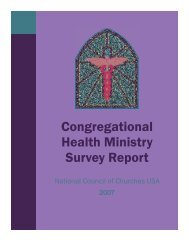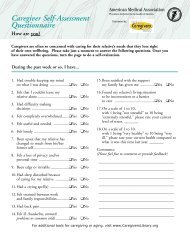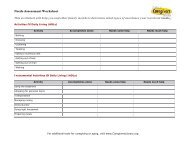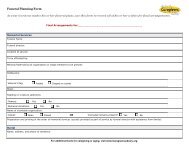MILES AWAY: - National Alliance for Caregiving
MILES AWAY: - National Alliance for Caregiving
MILES AWAY: - National Alliance for Caregiving
You also want an ePaper? Increase the reach of your titles
YUMPU automatically turns print PDFs into web optimized ePapers that Google loves.
Effect of Long-Distance<br />
<strong>Caregiving</strong> on Work<br />
As described earlier, the majority of respondents<br />
in this study were working either full or part-time<br />
(80%), although the percent working part-time<br />
increased substantially since the 1997 study (from<br />
8% to 18%). Other research has shown that<br />
employed caregivers often are required to make<br />
significant adjustments to their work in order to<br />
accommodate their caregiving responsibilities.<br />
These long-distance caregivers were no exception.<br />
Overall, half of the respondents reported having to<br />
make some workplace accommodation. The major<br />
adjustments they made were in coming in late or<br />
leaving early, missing days of work, rearranging<br />
their work schedule and taking unpaid leave. They<br />
missed an average of 20 hours of work per month.<br />
Table 6 shows the workplace effects of caregiving.<br />
Table 6. Work Effects of Long-Distance <strong>Caregiving</strong><br />
Came in Late/Leave Early<br />
Missed Days of Work<br />
Take Leave of Absence<br />
Rearranged Work Schedule<br />
Turned Down<br />
Work-Related Travel<br />
Considered Changing<br />
Employers<br />
Turned Down Work Relocation<br />
Considered Leaving<br />
Work Entirely<br />
Went From Full-Time to<br />
Part-Time<br />
Lost Benefits at Work<br />
Percent of Caregivers<br />
0% 10% 20% 30% 40% 50%<br />
In general, the percentage of long-distance caregivers<br />
who said that they missed days of work or<br />
came in late and left early has increased since the<br />
1997 study.<br />
5%<br />
4%<br />
4%<br />
3%<br />
3%<br />
7%<br />
12%<br />
25%<br />
36%<br />
44%<br />
9<br />
Distance makes a difference in the work accommodations<br />
made by the caregiver. Those caregivers<br />
who live closer to the care recipient are most<br />
likely to report that they have come in late or left<br />
work early. Those who live farther away are more<br />
likely to report that they have missed workdays as<br />
a result of caregiving.<br />
The small group of long-distance caregivers (5%)<br />
who are the only care provider were more likely<br />
than those who helped others or shared in the<br />
care to report that they had to rearrange their<br />
work schedule, turn down work-related travel, and<br />
to report they had lost benefits at work as a result<br />
of their caregiving responsibilities.<br />
Regarding their health, the majority of respondents<br />
said that caregiving had no effect on their health.<br />
However, 18% reported that their health had<br />
changed <strong>for</strong> the worse. And 18% of the respondents<br />
reported that their health was only fair or<br />
poor (versus 9% of the general US population).<br />
The combined stress of caring <strong>for</strong> someone and<br />
the stress of the potential of losing my job is<br />
becoming overwhelming.<br />
Distance and <strong>Caregiving</strong><br />
Family caregivers who live at a distance have<br />
that additional factor to weigh and manage when<br />
compared to those family caregivers who live<br />
nearby the person they are helping. Time, a scarce<br />
resource <strong>for</strong> most family caregivers, now becomes<br />
even more of a problem due to travel. Distance<br />
also may require family caregivers to have high<br />
out-of-pocket costs <strong>for</strong> both travel and purchases<br />
of needed goods and services to supplement family<br />
care. Distance may also complicate the caregiver’s<br />
ability to manage work and family. And, finally<br />
and most importantly to many family caregivers,









